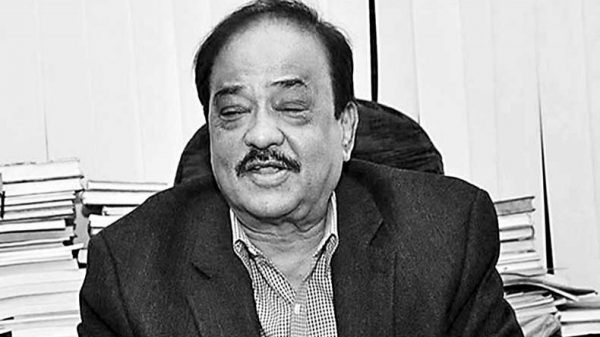The passing of a legend

I FIRST saw Mizanur Rahman Shelley in the first lecture I attended as a political science student in Dhaka University in 1965. He walked into the class with the roll-call register for which he had no use to lecture on Jean-Jacques Rousseau’s social contract theory, an otherwise drab topic. But the lecture he gave that day would have done justice if it had been delivered in a class on the English literature that underlined his fluency and command over the English language. A friend who studied economics as an inter-wing scholar and later became Pakistan’s home secretary wrote on my Facebook page that he would attend his classes because of sheer joy.
Mizanur Rahman Shelley was a lecturer when he walked to give us the lecture on Rousseau. We knew he was the super star of not just the political science department but of the arts and the social science faculties, in fact of the University of Dhaka. He joined the department after he had secured a first class first in both his Bachelor of Arts (Honours) and master’s degree examinations in politics science in 1962 and 1963 respectively. And before that, he stood first in the intermediate in the whole of the then East Pakistan, a feat of rare brilliance those days for a student planning to enter the university.
These achievements those days made Mizanur Rahman Shelley a household name in former East Pakistan. If he had achieved little else later in life, he would still have been remembered as one of Dhaka University and the country’s outstanding products. But then, these were only a small part of his lifetime achievements. As a student in Dhaka College and Dhaka University, he gave enough glimpses of his unlimited talent that flowered over the years in literature, journalism, academia, research and the visual media.
Mizanur Rahman Shelley tread all these fields of intellectual pursuits during his 76 years’ life span (1943–2019) with consummate ease and with major achievements in each of them where normal, extremely talented mortals, pursuing just one track in that wilderness of knowledge, would have considered their life successful if they had achieved in it the kind of success that Dr Shelly did in all the tracks he had pursued. Success came to him naturally, like he could not help himself, because to use a cliché, greatness was thrust upon him. Dr Shelley was thus a renowned novelist, poet, journalist, researcher, media personality and least but not last a civil servant and administrator of the highest pedigree leaving his admirers wondering what heights he would have climbed If he had pursued just one track.
Mizanur Rahman Shelley appeared in the CSS examinations in 1966 to join the civil service. He stood second in all-Pakistan effortlessly and joined the erstwhile CSP. At his funeral, a senior colleague told me something that I did not know. Officers of the ex-CSP cadre were placed in the gradation list based on the combined marks they achieved in the CSS examination and in the final pass out examination held on completion of their training at the Civil Service Academy. The rule had an exception. The position of the topper in the CSS examination was not affected by the result of the final pass out. Dr Shelley secured more marks in the two examinations combined but Shahed Saadullah was placed on top in the gradation list of ex-CSP officers of the 1967 batch because of the particular rule.
Mizanur Rahman Shelley, of course, was never bothered with results in any examination, academic or competitive, because that was not his style. The top positions came to him like it was his God-given entitlement. The ease with which he had stood second in the CSS examination that was considered in the Pakistan days the toughest competitive examination in the country underlined his natural brilliance. He would have become an officer of the ICS cadre during the British rule as effortlessly if he lived in those generations.
He left East Pakistan after the usual stint as an assistant commissioner and SDO (of Brahmanbaria) in East Pakistan to join the central secretariat in Islamabad. The news of his all-round brilliance had reached the Pakistani capital ahead of him. A story that went around those days that we came to know by word of mouth of the large unofficial fan club that had already evolved around him was that a Pakistani bureaucrat who had never seen Dr Shelley went to meet him at the secretariat. He had no trouble finding him when he saw a group of bureaucrats listening to a young man, mesmerised and he instantly knew he had found the man he had gone to see.
Mizanur Rahman Shelley did not abandon his academic pursuits. He had contacted the University of London while being posted to Islamabad. Dr GW Chowdhury, a minister of the Pakistan government at the time and a scholar of international repute in political science and international relations and also his teacher and colleague in Dhaka University, assisted him. Dr Shelley entered the School of African and Oriental Studies of the University of London in 1972 and earned his PhD in 1976 under the supervision of Peter Lyons, a distinguished professor and researcher.
His PhD dissertation was published as a book titled: Bangladesh: Emergence of a New Nation in a Multi-Polar World. It was one of the rare books on the emergence of Bangladesh made extraordinary because of Dr Shelley’s brilliant mind, dedicated and meticulous research and guidance of an extraordinary professor. Dr Shelley returned to Bangladesh soon after his PhD and joined the civil service only to retire in 1980. The civil service by then was suffocating him because he needed a far wider expanse than the narrow and restricted space that civil service provided for the fulfilment of his brilliant mind that had started to flower into full bloom.
Dr Shelley, freed from the bondage of a civil servant, became a prolific writer of novels, poems, short stories, research books, columns, et cetera. His weekly ‘Symphony of Our Times’ for New Age on the socio-political history of the times he lived has been most widely read that he was unable to finish because of death’s cold hands and would be sadly missed by the very wide readership that it had created. His published books have been many that included The Chittagong Hill Tracts: The Untold Story, The Windmills of Your Mind, a collection of essays on current issues, Pherari Prahar, collection of short stories, Patal Sharbaree, a novel, Tarar Khonje, a collection of poems; and Mukhar Aranya’, also a collection of poems.
Dr Shelley was not daunting physically. He was good-looking though, not the way a man’s handsomeness is described in our country. He was of average built but his face and the ever-present contagious smile on it attracted others to him instantly. And when he spoke, he would have the same effect on others as the flute of the Pied Piper of Hamelin had on the children in the fairy tale. Dr Shelley had a rare quality that no one of his generation or others before him or after who have lived as much as he did in the public domain, had. He could keep his audience spellbound with jokes that seemed never to end.
Most great individuals have written on death. One by Edger Allan Poe seemed to me to be best suited for this piece on Dr Shelley. Poe wrote: ‘The boundaries which divide Life from Death are at best shadowy and vague. Who shall say where the one ends, and where the other begins?’ The evening after we had put him to eternal rest, a few of us made a determined effort and visited the table in the Dhaka Club where Dr Shelley loved to spend his evenings in the final days of his life, seated close to his best friend since his childhood days, Jahangir Joshim Bhai.
The feeling was eerie and surreal. He seemed to be present in our midst perhaps in the shadowy and vague space of Edgar Allan Poe, his contagious smile a little less evident perhaps because he was unable to talk to us in his husky voice and do for us that for which he was loved so much, share his limitless wisdom as a master wit, with us. Adieu, Shelley Bhai! May the Almighty grant you eternal peace in your final place of resting!
Postscript: At the time of his final journey to the great unknown, Dr Mizanur Rahman Shelley was chairman of the Centre for Development Research, Bangladesh, chief adviser to the City University, chairman of Premier Leasing Finance Limited and chairman of the Academic Press and Publishers Library.























Leave a Reply